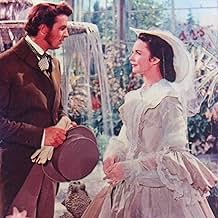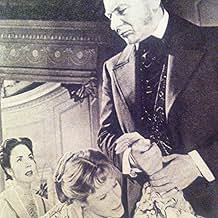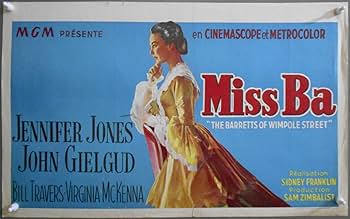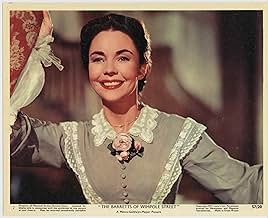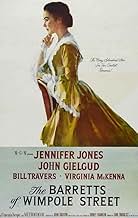Elizabeth Barrett's tyrannical father has forbidden any of his family to marry. Nevertheless, Elizabeth falls in love with the poet Robert Browning.Elizabeth Barrett's tyrannical father has forbidden any of his family to marry. Nevertheless, Elizabeth falls in love with the poet Robert Browning.Elizabeth Barrett's tyrannical father has forbidden any of his family to marry. Nevertheless, Elizabeth falls in love with the poet Robert Browning.
Christopher Cooke
- Minor Role
- (uncredited)
- Director
- Writers
- All cast & crew
- Production, box office & more at IMDbPro
6.5645
1
2
3
4
5
6
7
8
9
10
Featured reviews
costume drama
The Barretts are a wealthy London family headed by the commanding patriarch Edward Moulton-Barrett (John Gielgud). He has nine children and he demands to be their only object of affection. Elizabeth (Jennifer Jones) is a poet and often unable to walk. She is left stuck on her couch until fellow poet Robert Browning (Bill Travers) enters her life. Of course, father works against the relationship.
It is a costume drama from the 50's. It moves a little slow. I would consider modifying Elizabeth. A couple of things occur to me about her condition. Somebody has to help her dress and undress every day. Somebody has to take her to the bathroom. It doesn't have to be crude, but even alluding to all that would show how she is trapped inside her room and in herself. That does bring up her walking. Jennifer Jones is unable to project the needed frailty in her struggle to walk. She is using too much strength. Maybe she is projecting like she's in a play. On the other hand, John Gielgud has no trouble projecting any range he wants. He is doing a master class of acting. All in all, I like most of this.
It is a costume drama from the 50's. It moves a little slow. I would consider modifying Elizabeth. A couple of things occur to me about her condition. Somebody has to help her dress and undress every day. Somebody has to take her to the bathroom. It doesn't have to be crude, but even alluding to all that would show how she is trapped inside her room and in herself. That does bring up her walking. Jennifer Jones is unable to project the needed frailty in her struggle to walk. She is using too much strength. Maybe she is projecting like she's in a play. On the other hand, John Gielgud has no trouble projecting any range he wants. He is doing a master class of acting. All in all, I like most of this.
The Issue Ridden Mr. Barrett
This version of The Barretts Of Wimpole Street lacks for nothing, it's certainly an improvement over the 1934 version in a technical sense with the wide screen and color. It even has the same musical theme that Herbert Stothart wrote for the earlier version that starred Norma Shearer, Fredric March and Charles Laughton.
Jennifer Jones was following in some mighty big footsteps in portraying Elizabeth Barrett. Not only Norma Shearer's, but Katherine Cornell who originated the role in the original Broadway production in 1931 which ran for 370 performances in those Depression years. That is something that should tell you more than anything else about how good this play is. Jen creates her own sense of intelligent regal beauty as the frail poetess who summons up the courage and strength to stand up to her tyrannical father.
Charles Laughton was widely quoted as saying that in his portrayal of the issue ridden Moulton Barrett, the censors couldn't censor the gleam in his eye to get past the Code. The Code by 1957 was cracking and John Gielgud used a couple of direct physical moves rather than camera closeups to show his incestuous feelings for his daughter. Gielgud still gives a fine account of himself, though Mr. Laughton set the standard for that role. On stage it was originated by Charles Waldron who moviegoers will best remember from his last part as General Sternwood in The Big Sleep.
Bill Travers plays a somewhat different Robert Browning than Brian Aherne on stage and Fredric March on the screen. Both of those men are refined types and Browning is a bit more boisterous in this film than he was in the previous one. Still he's ready to do right by Jones and take her from the tyranny she lives under.
Though the 1934 film is an MGM classic, none of the people associated with this version have anything to be ashamed about. This is a story that could be made today. I can see the casting already, Hugh Grant as Robert Browning, Kate Winslet as Elizabeth Barrett, and Tom Wilkinson as Moulton.
I'd pay for a ticket to that. Until then we have two very good classic screen versions.
Jennifer Jones was following in some mighty big footsteps in portraying Elizabeth Barrett. Not only Norma Shearer's, but Katherine Cornell who originated the role in the original Broadway production in 1931 which ran for 370 performances in those Depression years. That is something that should tell you more than anything else about how good this play is. Jen creates her own sense of intelligent regal beauty as the frail poetess who summons up the courage and strength to stand up to her tyrannical father.
Charles Laughton was widely quoted as saying that in his portrayal of the issue ridden Moulton Barrett, the censors couldn't censor the gleam in his eye to get past the Code. The Code by 1957 was cracking and John Gielgud used a couple of direct physical moves rather than camera closeups to show his incestuous feelings for his daughter. Gielgud still gives a fine account of himself, though Mr. Laughton set the standard for that role. On stage it was originated by Charles Waldron who moviegoers will best remember from his last part as General Sternwood in The Big Sleep.
Bill Travers plays a somewhat different Robert Browning than Brian Aherne on stage and Fredric March on the screen. Both of those men are refined types and Browning is a bit more boisterous in this film than he was in the previous one. Still he's ready to do right by Jones and take her from the tyranny she lives under.
Though the 1934 film is an MGM classic, none of the people associated with this version have anything to be ashamed about. This is a story that could be made today. I can see the casting already, Hugh Grant as Robert Browning, Kate Winslet as Elizabeth Barrett, and Tom Wilkinson as Moulton.
I'd pay for a ticket to that. Until then we have two very good classic screen versions.
The trauma of jealous father
Twenty years earlier the same director made the same film in black and white, and this is supposed to be an improvement. It is in technicolour, and it is hard to believe any version could be better. They should actually be quite equal, as both versions use the same script and the same music - only the actors are different. It is also hard to believe that any actress could be better than Jennifer Jones, a specialist in sensitive roles approaching a breaking point, and it is also hard to believe that Fredric March was more perfect in the role than Bill Travers, who couldn't have been more convincing. On the other hand, John Gielgud and Charles Laughton should really have been equals in the formidable role of Edward Barrett, a Dickensian tyrant of the highest degree, who must be the more pitied for his fatal lack of understanding and psychology, refusing to realise that by exerting total strict control of his children they must be stifled, as Elizabeth expressly says, "I am a dying woman", only because of her overbearing father, while Browning actually restores her to life and makes her live for the first time in her life. The actors are all outstanding, but the greatest credit is with the play, which was rightfully a tremendous success from the start, and both films just have to make the play triumph.
If it's a word-for-word remake of the1934 film, why bother seeing this one?!
"The Barretts of Wimpole Street" (1957) is a word-for-word remake of the classic 1934 version by the same name. And, as such, I wonder why anyone should even bother seeing this film. After all, since the original version was a very nice and well-acted film (despite Charles Laughton overacting a bit), I can't see seeing a re-make--especially one that took almost no effort to make. Now I am not saying the 1957 film is bad--it is lovely to look at and the story is interesting. I just don't believe in rewarding studios for slap-dash remakes. In fact, unless the original film is seriously flawed and the remake corrects this, I can see no logical reason to see the remake and usually make it a habit to avoid them! So why did I watch the 1957 film? Well, I was flying cross-country and this film was one of the choices on the menu for in-flight films. And, in this sense, it fit the bill--and was pleasant but not particularly inspired.
One Lucky Cocker Spaniel
Being owned by two English cocker spaniels my comments are a bit biased.
This film is intriguing, not just for the overall story but the way Flush, Elizabeth's cocker, was so much integral part of it. Given the 120 line poem that she wrote about Flush it was pleasing to see that Flush was very much a part of the movie.
Sir John Gielgud was a superb actor cast in the role of Elizabeth's tyrannical father. Jennifer Jones performance above par. And of course there was Flush. One very lucky cocker spaniel.
This film is intriguing, not just for the overall story but the way Flush, Elizabeth's cocker, was so much integral part of it. Given the 120 line poem that she wrote about Flush it was pleasing to see that Flush was very much a part of the movie.
Sir John Gielgud was a superb actor cast in the role of Elizabeth's tyrannical father. Jennifer Jones performance above par. And of course there was Flush. One very lucky cocker spaniel.
Did you know
- TriviaMGM originally considered Grace Kelly for the lead role, but she was on suspension at MGM and was replaced by Jennifer Jones. For Jones, playing the role of Barrett on film was the realization of a long-standing dream from her days as a drama student, when she had persuaded husband-to-be Robert Walker to play Robert Browning to her Elizabeth in a scene from Rudolph Besier's play for their audition for readmission to a dramatic academy. Her idea worked, and both were invited back.
- GoofsThe London pillar boxes weren't painted red (as seen) until 1874; before that, they were green.
- ConnectionsReferenced in Wogan: Episode #10.35 (1990)
- SoundtracksWilt Thou Have My Hand
Music by Herbert Stothart
[Elizabeth and all her siblings sing the song in her bedroom as she plays the piano; theme heard in the score throughout the movie]
Details
- Release date
- Countries of origin
- Language
- Also known as
- Lo que las paredes ocultan
- Filming locations
- Marylebone Church, Marylebone, London, England, UK(wedding sequence)
- Production company
- See more company credits at IMDbPro
- Runtime
- 1h 45m(105 min)
- Aspect ratio
- 2.55 : 1
Contribute to this page
Suggest an edit or add missing content




